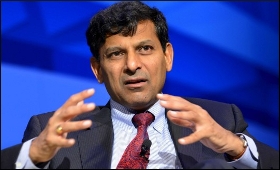|

|
Slowdown in credit growth due to stagnation in rates, NPAs: Rajan
|
|

|
|
| Top Stories |
 |
|
|
|
SME Times News Bureau | 04 Sep, 2017
The slowdown of credit growth in India is not the fallout of state-run banks attempting to resolve their massive non-performing assets (NPAs), or bad loans, problems and pre-dates the recent efforts by banks to clean up their balance sheets, former RBI Governor Raghuram Rajan has said.
"Once again there were a bunch of critics who claimed that cleaning up the bad loan problem was what led to the slowing of credit by the public sector banks," Rajan writes in his forthcoming book "I Do What I Do: On Reforms, Rhetoric and Resolve" that is due to be released next week.
"In a speech in June 2016 in Bengaluru, I made the case for the clean-up once again by asking these critics to actually look at data, which showed the slowdown started before the clean-up, probably as banks became aware of the magnitude of the problem," he said.
Rajan describes how the Reserve Bank of India's (RBI) repeated attempts to seek a resolution of stressed assets issue met with tepid response from bankers.
"As we found banks reluctant to recognize problems, we decided not just to end forbearance but also to force them to clean up their balance sheets. The Asset Quality Review, initiated in 2015, was the first major exercise of this nature in India," he writes.
Subdued inflation and demand prompted the RBI last month to reduce its key lending rate, for the first time since October 2016, by 25 basis points to 6 percent, which, however, failed to lift business sentiments.
"Addressing the twin balance sheet problem remains the RBI's top priority," the central bank said while announcing its monetary policy review, referring to the financial stress faced by banks and companies.
Experts feel that private investments won't go up on account of an interest rate cut because the cost of credit is not the main reason for investments not happening in India. Weak credit growth and low private investment has been an ongoing problem for some time now.
A study by industry lobby Assocham said private investments are unlikely to pick up before 2019 owing to low capacity utilisation and weak balance sheets.
Corporate India is currently heavily overleveraged as a result of flush of investments made in the boom period preceeding the global economic slowdown caused by the 2008-09US financial crisis. As India escaped the worst of the financial crisis, the flurry of investments continued. The loans taken by the private sector account for a substantial part of the massive NPAs accumulated by state-run banks.
NPAs have risen to over Rs 9 lakh crore and by the Banking Regulation (Amendment) Bill passed by Parliament last month, the RBI has been given power to refer these cases to the Insolvency and Bankruptcy Board.
The new law also has provisions empowering the RBI to issue directions to banks for resolution of stressed assets.
The sectors most responsible for the accumulated NPAs are steel, power, textiles and infrastructure as RBI has identified 12 large loan defaulters who account for 25 percent of the total NPAs. Action has already begun under the Insolvency and Bankruptcy Code against some of these defaulters, including Essar Steel, Bhushan Steel and Bhushan Power.
|
|
|
| |
|
|
|
|
|
|
|
|
|
|
|
|
|
|
| |
| Customs Exchange Rates |
| Currency |
Import |
Export |
US Dollar
|
66.20
|
64.50 |
UK Pound
|
87.50
|
84.65 |
Euro
|
78.25
|
75.65 |
| Japanese
Yen |
58.85 |
56.85 |
| As on 13 Aug, 2022 |
|
|
| Daily Poll |
 |
 |
| PM Modi's recent US visit to redefine India-US bilateral relations |
|
|
|
|
|
| Commented Stories |
 |
|
|
|
|
|
| |
|